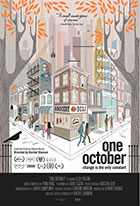
One October 2017
Distributed by Passion River Films, 154 Mt. Bethel Rd., Warren, NJ 07059; 732-321-0711
Directed by Rachel Shuman
DVD , color, 56 min.
General Adult
Urban Areas, Presidential Elections, Financial Crisis, Gentrification
Date Entered: 04/12/2018
Reviewed by Dmitrii Sidorov, California State University, Long BeachThis film is an attempt at capturing public sentiments in New York City in October 2008, against the background of several looming changes: the likelihood of the first Black American winning a presidential election, the city’s gentrification, and the global financial crisis.
One October purports to present “a lyrical time capsule” yet capsules are about constraints, often needed, for example, to deliver medicine or preserve sentiments. Perhaps such a constrained presentation in the film will find its own grateful audience. Yet limitations are not that good for analysis and understanding, the film too often seems to be one-sided and biased.
For example, it takes time in the film to find out who is running against Obama in the election as if in October 2008 everything had already been certain. Only voices of those who are afraid of gentrification are included—we are never given the chance to see any of the entrepreneurial young people who open hipster places and launch gentrification. Similarly, as a global financial center, New York City provides a rare opportunity for the film’s director to interview not only lay-people but also some agents of the financial system. The film’s premise at giving voice to “common” people backfires. It looks exceptionally shallow in conveying common knowledge, capturing stereotypical landscapes and scenes, and failing to provide any complexity of opinions needed for understanding processes such as elections, gentrification, or financial crises.
Arguably, One October is not a visually complete film. It is dominated by the radio host Clay Pigeon, who along with his outdated audio recorder would be more effective if less visible and allow viewers to focus on the city and its scenes. As a document in oral history, One October is fine; in fact, “some of the interviews that are in the film were also broadcast on WFMU as part of his show.” As a film, it fails to excite as if done by a tourist happy to capture stereotypical visuals and conduct common-sense interviews without getting onto any insightful places beyond the tourist trap. Released a decade after the 2008 election, the film had a unique opportunity to revisit some of the post-Obama, post-gentrification, and post-financial crisis sites and examine their transformations – yet that would be a different film.